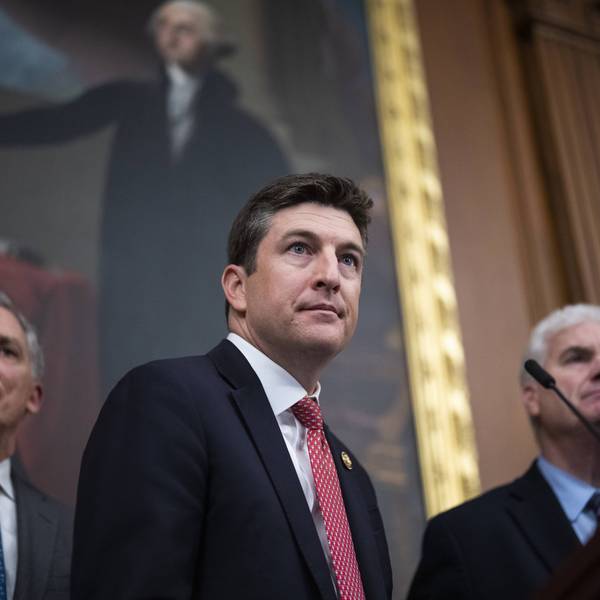Many in the media are portraying the Republicans' move to invoke the nuclear option to confirm Neil Gorsuch as a mere squabble over Senate rules, the latest example of hyper-partisanship in Washington that both parties are equally responsible for.
The "both sides do it" narrative is the worst kind of false equivalence. In fact, the GOP's use of the nuclear option highlights in stark terms the Republican Party's unique hostility to democracy, which has come to define the party in recent years through efforts like voter suppression, gerrymandering, and a stolen Supreme Court seat. (Not to mention Donald Trump's attacks on the core pillars of democracy--like fair elections, a free press, and an independent judiciary.)
Following President Obama's election, when Republicans took control of many state legislative chambers after the 2010 election, 22 states passed new restrictions on voting. Through challenging the Voting Rights Act, voter-ID laws, cutbacks to early voting, limits on voter registration drives, closing down polling places, purging the voting rolls, and disenfranchising ex-offenders, Republicans attempted to manufacture an electorate that was more advantageous to their party. So far this year, 87 bills to restrict access to voting have been introduced in 29 states.
In addition, Republicans controlled the redistricting process in 20 states after the 2010 election, compared to only 11 for Democrats, and aggressively gerrymandered state legislative seats and US House districts to retain power for the next decade. In 2012, for example, Democratic candidates for the US House of Representatives won 1.4 million more votes, but Republicans won 33 more seats. Courts have found that Republican-drafted redistricting maps in states like North Carolina and Texas intentionally discriminated against minority voters.
Republicans in North Carolina took their hostility to the democratic process to the extreme degree after the 2016 election when Democrat Roy Cooper was elected governor, passing a series of bills in the lame-duck state legislative session to reduce or eliminate the governor's essential powers. The bills prevented the governor from appointing a majority of members to the state Board of Elections or 100 county boards of elections; reduced the number of public employees the governor could appoint from 1,500 to 425 and prevented the governor from appointing members to boards of state universities; and made it harder for the state Supreme Court, which has a 4-3 Democratic majority, to review future challenges to election-law changes. It was nothing less than a legislative coup. The courts blocked the changes to the boards of elections, but Republicans are still trying to change the rules.
When Republicans didn't like the fact that President Obama would get to fill Antonin Scalia's Supreme Court seat in 2016, they simply invented a new argument--that a president in the last year of his term or during an election year couldn't make a new appointment--to avoid giving Merrick Garland a hearing, let alone a vote. In fact, on seven different occasions since 1912, a president in the last year of his term or during an election year was able to fill a Supreme Court vacancy. "All vacancies in an election year in the last 116 years were filled," reports Factcheck.org.
I'm no great fan of the filibuster, but it's stunningly hypocritical for Republicans to deny Garland a hearing and a vote and then change the Senate rules to confirm Gorsuch. The very things they demanded for Gorsuch, they denied to Garland. Yes, Democrats did invoke the nuclear option for lower-court nominees in 2013, but Republicans have been far more obstructionist toward judicial nominations than Democrats have, as David Leonhardt of The New York Times wrote recently.
The pattern is clear--when Republicans don't like the legislative rules or an outcome of an election, they change the rules or try to nullify the election. The story isn't that both sides are to blame for hyper-partisanship in Washington. It's that one party believes in democracy and the other does not.



